“As I slowly grow wise I briskly grow cautious.”
Mark Twain, “English as She Is Taught”
Archives for February 2013
TT: At least a thousand words
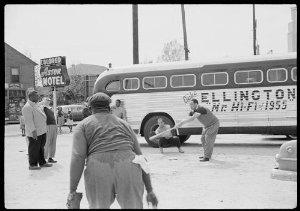 I’m now assembling and obtaining permission to reprint the photographs that I plan to include in Duke: A Life of Duke Ellington. I recently ran across this “image” (as we say in the publishing business) in the course of my research. Nothing that I could possibly say about it would be as eloquent as the thing itself.
I’m now assembling and obtaining permission to reprint the photographs that I plan to include in Duke: A Life of Duke Ellington. I recently ran across this “image” (as we say in the publishing business) in the course of my research. Nothing that I could possibly say about it would be as eloquent as the thing itself.
If you want to understand what Ellington’s life as an American artist was like, this explains a good-sized chunk of it.
TT: The takers and the “tooken”
In today’s Wall Street Journal I review two outstanding Florida productions, Palm Beach Dramaworks’ A Raisin in the Sun and Orlando Shakespeare’s Othello. Here’s an excerpt.
* * *
What makes a play political? Sometimes it’s all in the timing. “A Raisin in the Sun,” Lorraine Hansberry’s 1959 drama about a black family that wants to move to a white neighborhood, doubtless came across as strongly political when it first opened on Broadway. How could it have been otherwise? Fifty-four years later, though, “Raisin” seems not so much a here-and-now assault on racism as a history play about black culture in the Eisenhower era, and what hits you hardest is the unflinching truthfulness with which Ms. Hansberry has enacted the hurtful and universal complexities of family life.
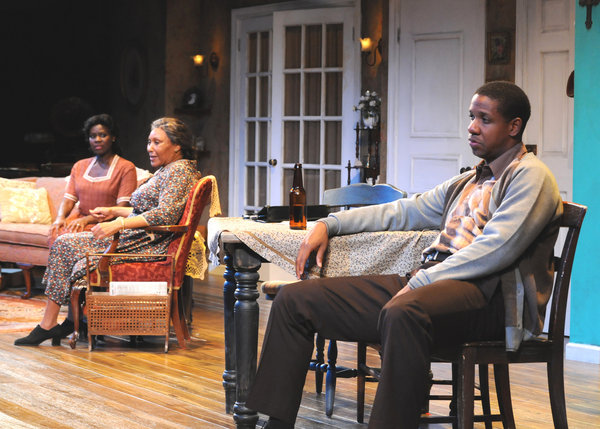 Though it’s been nine years since “Raisin” was last seen on Broadway, it was already receiving its fair share of regional productions prior to the 2010 premiere of “Clybourne Park,” in which Bruce Norris imagined what might have happened to the house that the Younger family bought in the early ’50s. The success of Mr. Norris’ toothless little satire, however, has inspired still more companies to revive the original play on which it is based, which is what brought me down to West Palm Beach to see “Raisin.” I already knew that it was effective, but Palm Beach Dramaworks’ production, simply staged by Seret Scott and acted to perfection by a phenomenally well-chosen cast, suggests that it is in fact one of the finest American plays of the 20th century…
Though it’s been nine years since “Raisin” was last seen on Broadway, it was already receiving its fair share of regional productions prior to the 2010 premiere of “Clybourne Park,” in which Bruce Norris imagined what might have happened to the house that the Younger family bought in the early ’50s. The success of Mr. Norris’ toothless little satire, however, has inspired still more companies to revive the original play on which it is based, which is what brought me down to West Palm Beach to see “Raisin.” I already knew that it was effective, but Palm Beach Dramaworks’ production, simply staged by Seret Scott and acted to perfection by a phenomenally well-chosen cast, suggests that it is in fact one of the finest American plays of the 20th century…
Traditional stagings of Shakespeare’s plays are hard to come by these days, and it’s refreshing to be reminded, as Orlando Shakespeare is currently doing in its outstanding version of “Othello,” that the greatest of all English-speaking playwrights can scrape along quite nicely without hip costumes or self-consciously clever directorial touches. Brian Vaughn’s production takes place in 16th-century Venice and Cyprus, not Greenwich Village or Nazi Germany, and unfolds on a flexible Elizabethan-style unit set designed by Bert Scott that hurls you from scene to scene with electric swiftness. Nothing is allowed to divert your attention from Shakespeare’s harsh portrayal of jealousy run rampant, and the cast tells the tale briskly and forcefully….
* * *
Read the whole thing here.
TT: Almanac
“An artist is a man of action, whether he creates a personality, invents an expedient, or finds the issue of a complicated situation.”
Joseph Conrad, The Mirror of the Sea
TT: On the nose
Rick Brookhiser reminded me last night to strike the Jane Chord of Duke: A Life of Duke Ellington:
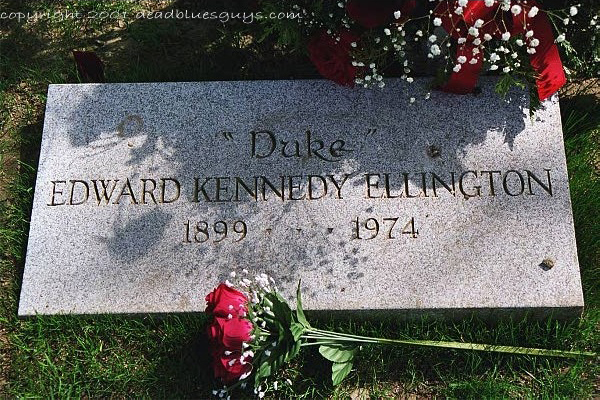
The Jane Chord, to which Bill Buckley introduced us years ago, is a concept originally promulgated by Hugh Kenner. The idea is that if you make a two-word sentence out of the first and last words of a book, it will tell you something revealing about the book in question. Or not: the Jane Chord of Pride and Prejudice is It/them. But every once in a while you run across a Jane Chord so resonant that it makes the room shiver–the chord for Death Comes for the Archbishop is One/built–and even when a famous book yields up nonsense, it’s still a good game to play….
I rejoice to report that the Jane Chord of Duke is, believe it or not, He/true. Success is inevitable!
TT: Two’s company
Now that I’ve finished Duke: A Life of Duke Ellington, I find myself thoroughly disconcerted to have written two jazz biographies in a row.
I was typecast as a specialist in music throughout the first part of my career as a writer, and I worked very hard for a very long time to extract myself from that pigeonhole. Least of all did I ever want to be seen as someone who wrote exclusively or primarily about jazz, not because I didn’t love it passionately but because the audience for jazz isn’t all that large. In any case, my cultural interests have always extended far beyond the compass of jazz in particular and music in general, and I was determined to get myself into a position where editors thought of me first and foremost as a generalist, a “utility outfielder” who knew as much about Chekhov and Vuillard as Fauré or Bix Beiderbecke.
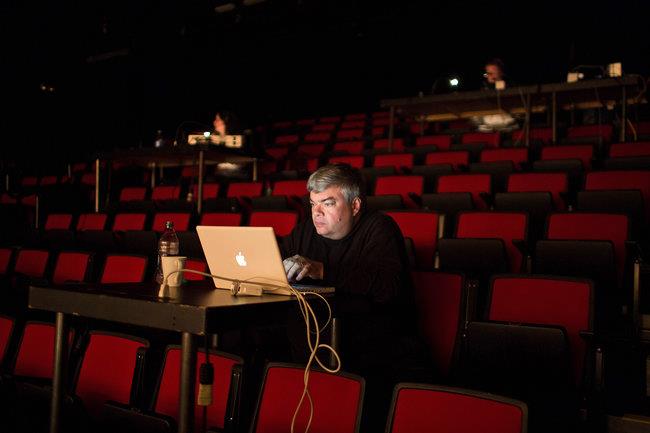 In time that started to happen, and now it’s come to pass. Not only am I The Wall Street Journal‘s drama critic, but I also write a biweekly cultural column for the Journal in which I range as far afield as I like, and my title at Commentary was changed four years ago from “music critic” to “critic-at-large.” Between 2002 and 2009 I published biographies of H.L. Mencken, George Balanchine, and Louis Armstrong, and I also published a self-anthology of essays that covers every branch of artistic endeavor save for the visual arts, in which I have since immersed myself.
In time that started to happen, and now it’s come to pass. Not only am I The Wall Street Journal‘s drama critic, but I also write a biweekly cultural column for the Journal in which I range as far afield as I like, and my title at Commentary was changed four years ago from “music critic” to “critic-at-large.” Between 2002 and 2009 I published biographies of H.L. Mencken, George Balanchine, and Louis Armstrong, and I also published a self-anthology of essays that covers every branch of artistic endeavor save for the visual arts, in which I have since immersed myself.
Hence it feels strange to have returned to the same well for the second time in a row, and to have written about a pair of closely contemporary jazz musicians. The fact is that my decision to write two jazz biographies signifies nothing more than that I thought it would be both interesting and fun (which it was) to write about Duke Ellington. My cultural horizons are still wide, and they show no signs of shrinking in middle age. If anything, I spend less time thinking about music now than I did, say, five years ago.
All that said, I’ve enjoyed spending an extended period of time (for me, anyway) pretending to be a specialist. I have no trouble understanding the appeal of being a scholar who spends his whole life digging the same hole deeper and deeper, and who knows pretty much everything there is to know about one person. I could easily have gone in that direction, and I think it would have made for a satisfying life.
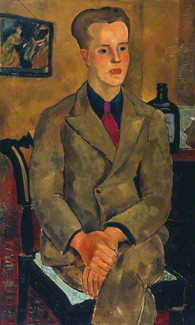 But I didn’t. For some reason that I don’t fully understand, I decided around the time that I graduated from college that I didn’t want to specialize in anything, thus ensuring that I wouldn’t become an academic, much less a professional musician. Instead I write about all of the arts, and of late I’ve branched out to become a playwright and opera librettist as well. It’s always been my goal to emulate the composer-critic-conductor Constant Lambert, who figures prominently in the pages of Duke and whom Anthony Powell described as having “an unrivalled capacity, amounting to genius, for seizing on the essential point in any of the arts.” I’m the furthest thing from a genius–I’ve known enough geniuses to know that–but I’m proud to have been able to transcend mere dilletantism and function as a true professional in more than one field.
But I didn’t. For some reason that I don’t fully understand, I decided around the time that I graduated from college that I didn’t want to specialize in anything, thus ensuring that I wouldn’t become an academic, much less a professional musician. Instead I write about all of the arts, and of late I’ve branched out to become a playwright and opera librettist as well. It’s always been my goal to emulate the composer-critic-conductor Constant Lambert, who figures prominently in the pages of Duke and whom Anthony Powell described as having “an unrivalled capacity, amounting to genius, for seizing on the essential point in any of the arts.” I’m the furthest thing from a genius–I’ve known enough geniuses to know that–but I’m proud to have been able to transcend mere dilletantism and function as a true professional in more than one field.
To be sure, I am now officially in a position to call myself the biographer of the two greatest jazz musicians of the twentieth century. I can absolutely guarantee you, however, that I won’t be shooting for three. If I write another biography, which I’d like to do, it will almost certainly be about somebody who isn’t a jazz musician, a choreographer, a journalist–or a man.
Who might she be? Beats me. But if and when when the right woman comes along, I’ll know. And if not, I’ll write another play instead. Or an opera. Or something completely different.
* * *
Constant Lambert’s The Rio Grande, a 1927 setting of a poem by Sacheverell Sitwell, performed by Jack Gibbons, Sally Burgess, the Opera North Chorus, and the English Northern Philharmonia, conducted by David Lloyd-Jones:
TT: So you want to see a show?
Here’s my list of recommended Broadway, off-Broadway, and out-of-town shows, updated weekly. In all cases, I gave these shows favorable reviews (if sometimes qualifiedly so) in The Wall Street Journal when they opened. For more information, click on the title.
BROADWAY:
• Annie (musical, G, reviewed here)
• The Mystery of Edwin Drood (musical, PG-13, closes Mar. 10, reviewed here)
• Once (musical, G/PG-13, nearly all performances sold out last week, reviewed here)
• The Other Place (drama, PG-13, closes Mar. 3, reviewed here)
OFF BROADWAY:
• Avenue Q (musical, R, adult subject matter and one show-stopping scene of puppet-on-puppet sex, reviewed here)
• The Fantasticks (musical, G, suitable for children capable of enjoying a love story, reviewed here)
CLOSING SOON IN ORLANDO, FLA.:
• Laughter on the 23rd Floor (comedy, PG-13, closes Feb. 24, reviewed here)
CLOSING SOON ON BROADWAY:
• Picnic (drama, PG-13, closes Feb. 24, reviewed here)
• Who’s Afraid of Virginia Woolf? (drama, PG-13/R, closes Mar. 3, reviewed here)
TT: Almanac
“It is not the clear-sighted who lead the world. Great achievements are accomplished in a blessed, warm mental fog.”
Joseph Conrad, Victory
